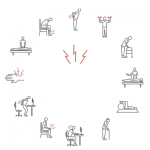(Reuters Health)—The risk that surgery patients will become chronic opioid users may be similar after minor procedures or major operations, a U.S. study suggests.
Three to six months after surgery, new chronic opioid use was about 5.9% with minor operations and 6.5% with major surgery, the study found. The rate was just 0.4% in people who didn’t have surgery.
A history of chronic pain appeared to be a better predictor of postoperative opioid use than the type of surgery, the study found. Compared with patients who didn’t become chronic opioid users after surgery, people who did were more than 50% more likely to have had arthritis or chronic back pain before their operations.
“This study shows that new chronic opioid use after surgery may be one of the most common complications after surgery,” says lead study author Dr. Chad Brummett of the University of Michigan in Ann Arbor.
“Given that the rates of new chronic use did not differ between major and minor surgery, this suggests that patients continue to use their opioids for reasons other than the pain from the surgery,” Brummett adds by email.
Addressing patients’ acute pain during their recovery from surgery may be a way to prevent them from becoming a statistic in the opioid epidemic, he suggests.
About 50 million people have surgery that doesn’t require an overnight hospital stay each year. The new findings suggest that more than 2 million people may become chronic opioid users after these operations, researchers note in JAMA Surgery, April 12. Adding inpatient procedures might make the tally of postoperative chronic opioid users even higher.1
For the study, researchers examined insurance claims data from 2013 to 2014 for about 36,000 adults ages 18–64 who had not used opioids in the previous year, at least until the month prior to surgery.
About four in five patients had minor surgical procedures for things like removing varicose veins or hemorrhoids or treating carpal tunnel syndrome. Roughly one in five had major operations, such as bariatric surgery, hernia repair or hysterectomy.
Patients commonly need pain relief in the days or weeks after surgery. Researchers defined “persistent opioid use” as filling prescriptions for these narcotics between 90 and 180 days after surgery.
People who smoked before surgery were 34 percent more likely to become persistent opioid users after their operations, the study found. With alcohol and substance use disorders, the odds of opioid use after surgery were 34 percent higher.


